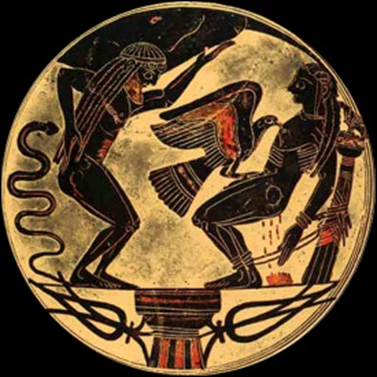Prometheus
Man the discoverer of the undying fire,
In the flame he kindled burning like a moth;
— Book 7 Canto 4
Prometheus is one of the four sons of the Titan Iapetus. The latter is the symbol of the development of human mental consciousness which must bridge the gap between the animal mind and the supramental.
His first son is Atlas, who was condemned by Zeus to carry the sky on his shoulders: ‘he supports the vast sky with his head and his tireless arms’. He is the symbol of the force that separates spirit from matter. His daughters, the seven Pleiades, represent the void that must be filled, the steps that humanity must climb in mental consciousness to reach the supramental. Sri Aurobindo has identified them as physical mind, vital mind, intellect, higher mind, illumined mind, intuitive mind and overmind.
Other sons of Iapetus include Prometheus, symbolising that which in man ‘puts forth his total submission to what resides in the centre of being’ and Epimetheus ‘that which remains on the surface of this submission’ – in other words, in appearances.
Hesiod tells us that the will of Prometheus was in conflict with that of Zeus.
It can be understood as an opposition of priorities, between the need for mental development and the need for surrender to the inner being. In fact, this surrender is likely to be illusory as long as discernment is not acquired. This is what is developed in the myth of Pandora to whom Epimetheus unites himself despite the warnings of his brother Prometheus.
Mythology records several episodes of this struggle. As Prometheus had tried to deceive Zeus, the latter hid the fire of heaven from the mortals. But Prometheus recovered the seed of fire, ‘sperma puros’, the contact with the inner fire, Agni, and gave it back to mortals hidden in a hollow fennel-stalk, unbeknownst to Zeus.
He was, therefore, considered a benefactor of humanity by the ancients, for he represents that which reconnects mental man with his inner divine source.
Zeus, in revenge, asked Hephaestus to create Pandora and gave her to Epimetheus: men would henceforth pursue illusory goals.
Finally, Zeus had Prometheus chained to a mountain and sent his eagle to torment him. Every day, the eagle would devour Prometheus’ liver, but it would miraculously regenerate at night.
Prometheus. Vatican Museum. Public domain
The action of the eagle represents the alternating influence of the powers of fusion and separation in the mind, manifested in the intellect and intuition.
As long as the ascent from the planes of the mind to the overmind is not achieved, Prometheus remains chained and man remains subject to the cycles of his own mind. (See The Cycles of the Mind)
Sri Aurobindo takes the example of Prometheus when he speaks of the man of pain, tormented by the cosmic cycles, and his revolt against the divine ‘inhumanity’.
